Sivan Auerbach is in her peak season on the running track, during which she broke three Israeli records and won the BIG12 championship in the mile run, representing Oklahoma State University. In an interview with ‘Davar’ she says: “I think that in an Olympic year and a European Championship year, every athlete has the understanding that there is no time to waste. You have to take advantage of every opportunity and every competition that comes along to give 100 percent.”
The 23-year-old runner came into the Olympic year in the best shape of her career and with impressive mental strength. “These records are an expression of a change in the way of thinking,” she says and admits, “The Olympics is my dream from a very young age, it was clear to me that I would be there. On the other hand, it seemed far away and it’s crazy that this is the year. On paper, it looks like a goal with slim chances , but for me that’s not a good enough reason not to try with all my might.”
Auerbach is the Israeli champion in the 800 meters and 1,500 meters. This season she broke the Israeli record in the mile, 800 meter indoor and the most special record for her in the 1,000 meter run. “It was my favorite run in the cadetship years,” says Auerbach. “The record used to belong to Edna Lakri who still holds the mythical record of the 800 meters. So for me this is a kind of milestone, a step on the way to the record of the 800 meters.”
Sivan Auerbach at the Israel Athletics Championship (archive photo: Maxim Dupliy, courtesy of the Athletics Association)
In the past, Auerbach was considered the “wonder girl” of Israeli athletics in middle races. At the age of 16, she finished in second place in the Israeli Championships for seniors in the 800 meter run and qualified for the finals of the European Championships for Cadets. A year later, she became the first Israeli in the races to qualify for the finals of the Cadet World Championship. But precisely at that high point everything changed.
“Each year I progressed in a very linear way. I had the naive expectation in retrospect that it would continue all the time,” says Auerbach. “I was in the final of the European Cadet Championship, a year later in the final of the World Cadet Championship. So I will be in the final of the World Youth Championship and of course when I leave the youth category I will make it to the Olympics. It was obvious to me, I never had a doubt.”
In the 2017 World Cadet Championship final, she finished in eighth place, after stumbling fifty meters to the end and walking to the finish line. “In hindsight it turned out that I ran with two stress fractures and two broken legs,” she says. “I had surgery and basically it took me four years to break my personal record again.”
“My body didn’t have the chance to develop properly”
The injury did not come by accident. “It’s probably not a coincidence that I had stress fractures,” admits Auerbach and shares a topic that is not about Israeli sports. “I didn’t really go through puberty. My body didn’t have the chance to develop properly. I got my first period at the age of 15 and it wasn’t regular at all. I would get a period if I was on vacation or sick and couldn’t exercise.”
“When we would go to the doctors, they would tell us that it is very common for young female athletes not to have a regular period. They said that everything is fine as long as you get a period when you go on break. My parents were very worried about how it would affect my future and if I would be able to give birth.”
Auerbach says that following the injury that disabled her from running, her body began to change. “I went through a very accelerated and necessary maturation process for three years. I think that if I hadn’t stopped, I would have ended up with a serious injury. If it hadn’t happened when my body still had a chance to develop and recover properly, it would have really been the end of my career. This He taught me how to deal with injuries and not take running for granted.”
In 2021, the American runner Marie Kane opened the issue for the first time in a press interview, when she sued the decorated coach Alberto Salazar and the “Nike” company for 20 million dollars.
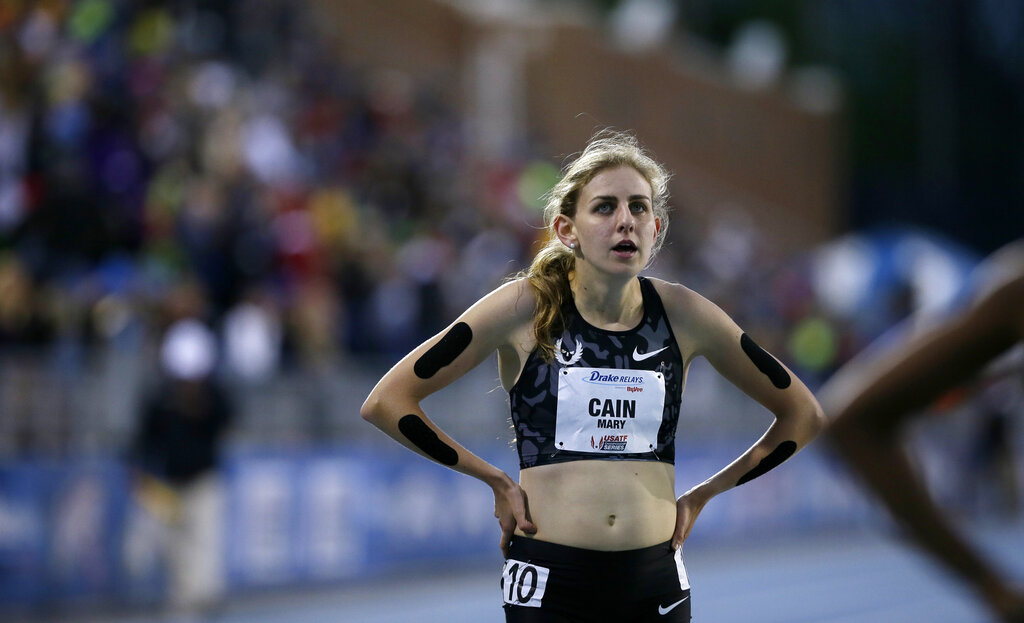
The American athlete Marie Kane at the competition in Iowa in 2016. “Raised a wave of awareness” (Photo: AP/Charlie Niebergal)
“She raised a wave of awareness that too low a body weight causes low bone density. In women, this is a common problem,” says Auerbach. “Until then, I hadn’t heard about it, we weren’t talked about it at that time and even today. No one asked me if I was getting a normal period. On the contrary, there was a lot of talk with me about weight, how much I weighed now and how much before competitions.”
“As a young athlete, I did not suffer from eating disorders,” emphasizes Auerbach. “But I did have in my mind a connection between my weight and how fast I would be able to run. In my opinion, there is nothing at all to talk about at such a level about nutrition and weight in adolescence, you should let everyone’s body go through the process it needs to go through and not manipulate it.”
“Awareness of the phenomenon and its prevention can save a female athlete’s career”
“It’s a relatively well-known phenomenon and it’s preventable, so it’s important to talk about it, it’s called in the professional language ‘relative energy deficiency syndrome’,” Prof. Danny Nemet, from the Meir Medical Center of the Klalit Group, who serves as the medical director of the Olympic Committee in Israel, tells ‘Daver’. “There are teenage girls who expend a lot of energy in physical activity and are not always able to restore it with appropriate nutrition. Some of the things that result from this are the problem of irregular periods and stress fractures. This is due to not having enough energy to meet the demands of the exercising body.”
“In girls who do not menstruate at a late age because of this syndrome, the chance of injury is very high, can reach 80 percent. The body experiences stress and recovery can take a very long time. Once the athlete is injured, it takes between months and years until the body recovers, sometimes not It will be possible to return to activity. There is frustration here for the athlete and a loss of significant potential.”
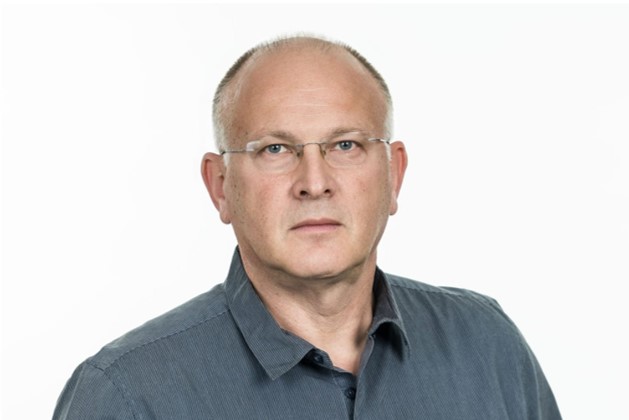
Prof. Danny Nemet, from the Meir Medical Center of the Klalit Group, the medical director of the Israel Olympic Committee (photo: Israel Olympic Committee)
“I believe that every young male and female athlete should be accompanied by a sports doctor, because most doctors do not understand what it means to be a teenager and an athlete. When there is an athlete at such a level, she should be accompanied by a sports doctor, a nutritionist and, of course, a sports psychologist.”
Do you see a change?
“Nowadays there is definitely a change. Many professional sports associations actually understand the importance of accompanying the teenage athlete. An association that does not understand this is its athletes are in trouble. The Olympic Committee has a gynecologist Dr. Einat Chaikin from the Meir Medical Center who meets with the athletes on a regular basis. But that’s at the level of the Olympic squad. Awareness of the phenomenon and its prevention can save an athlete’s career and prevent serious injuries that will accompany the athlete for life.”
“I don’t know if I like to run, I like to win”
Following the injury, Auerbach did not compete for a year and when she returned to activity she was unable to recover her ability for another three years. “I had recurring nightmares at night that every time I ran 800 meters my record from the age of 16, I always dreamed that I ran one second more. Every time I make it to the competition and almost,” says Auerbach. “It was a very big relief at the end of 2020, that I was finally able to drop from 2:09 minutes.”
The young star simply disappeared for four years from the athletics radar. “Somewhere I was ashamed. I wanted to first get in shape that I know I can be in and then go back to competing. These are voices that accompany me to this day. I constantly have to deal with this matter of how good I was at my younger ages and where I am now.”
Now, with a more mature and sober eye, she admits that it was precisely that severe injury that gave her the desire to succeed again. “I try to tell myself that I’m going through my process. I’m glad I got injured. I think in retrospect it was such a significant turning point in my career. Until the injury, I was going very smoothly. I bombed in every competition,” she says. “When they would ask me about the future, I would say that I don’t know if I will still run. It sounds a bit absurd, but I was not faced with a situation that forced me to choose it. Because it came easily, it went well. I would say that I don’t know if I like running, I Love forever”.
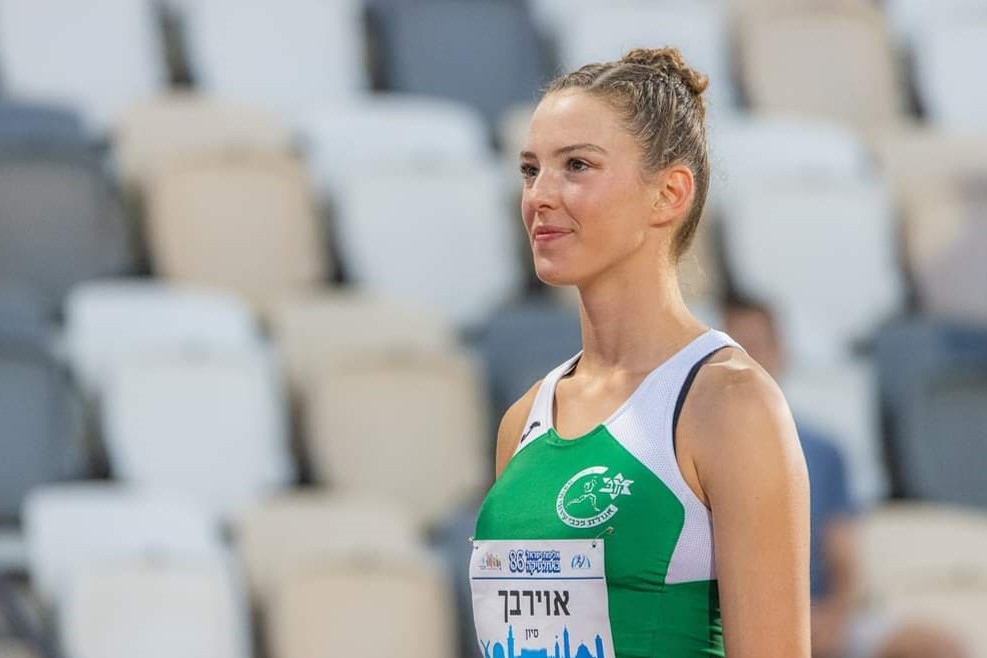
Sivan Auerbach in Maccabi Haifa uniform at the 2022 Israel Athletics Championships (Photo: Robbie Yahav)
During the rehabilitation process from the injury, something new lit up in Auerbach, suddenly nothing was taken for granted and the desire to return to running began to pulsate strongly in her. “For a year I was not allowed to take two running steps. I would walk on the boardwalk in Tel Aviv and see people jogging with bags and water bottles and I would say, ‘Why can they and I can’t?’ So let me just go back to running. That was actually my turning point in sports.”
Auerbach grew up in Moshav Ein Ayala, on the Carmel coast. From a young age she loved to run, at the age of seven she began to join her father in amateur races. “I used to run in the children’s division. I did well, I used to win all the time,” she says. “All my childhood I was in a ballet class, we didn’t know that there was competitive athletics for children.”
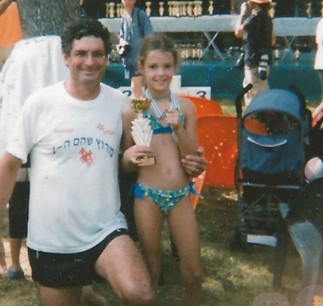
Sion Auerbach at the end of one of her first running competitions at the age of 8 (photo: private album)
The transition to the branch happened at the age of ten, when her father was on sabbatical in California and her parents were looking for a class for her. “Someone recommended they put me in athletics. I joined and I really liked it. For me it was mainly a social setting, this year I had a hard time adjusting to school. When we returned to Israel I wanted to continue and we were directed to Maccabi Haifa Carmel.”
For the past four years, Auerbach has been studying and competing at Oklahoma State University. “I did a very thorough research with my mother and we saw that girls of my level come to Oklahoma State, but leave at the European and Olympic level. Talents are developed here in an exceptional way and there is a very strong team here. During my time here, we went from being in 20th place to 3rd place in US field races “B”.
In addition to athletic training, Auerbach is doing a triple degree in computers, computer science and electrical engineering. In November of this year, she won a special “Elite 90” award given to the athlete with the highest grade point average, at the College Field Championships. “It was a few weeks after October 7. I received an award for academic excellence and it was important to me to go up on stage wrapped in the Israeli flag.”
Why did you choose Oklahoma State?
“I didn’t imagine myself in Oklahoma of all places. At first, I looked at places that were better known academically. I realized that in any place like that, although the studies would be at a high level, I felt that the team and the coach wouldn’t really give me the best opportunity to succeed. I knew that if I didn’t give 100 percent to Sports at this stage of my life so I will regret it and I will always have questions of what would have happened if.”
What is the difference in training in colleges compared to the country?
“The main change is the possibility to train with other girls. In Israel I would train alone or with boys who helped me. There was no one in the club who ran at my level. Even in competitions I would compete alone, running front from start to finish. This is not a tactic that works in championships. On the other hand, Here I compete every two weeks and get in shape. It makes me improve. Already in the first year I broke my record by two seconds. In the second year by six seconds.
“We felt like ambassadors of the country”
The beginning of the war and the events of October 7 affected the attitude towards Israel at universities in the US. Unlike many campuses, Auerbach says that at Oklahoma State the atmosphere is supportive of Israel. “In Oklahoma they love Israel and there is a positive atmosphere.”
Next to her on campus are the athlete Addiso Guede and the basketball player Lior Garzon. The three athletes felt that the college should come out with a clear statement against the terrorism of Hamas and made sure that “we felt like ambassadors of the country. It really bothered us that the university didn’t say anything after the events of October 7th”.
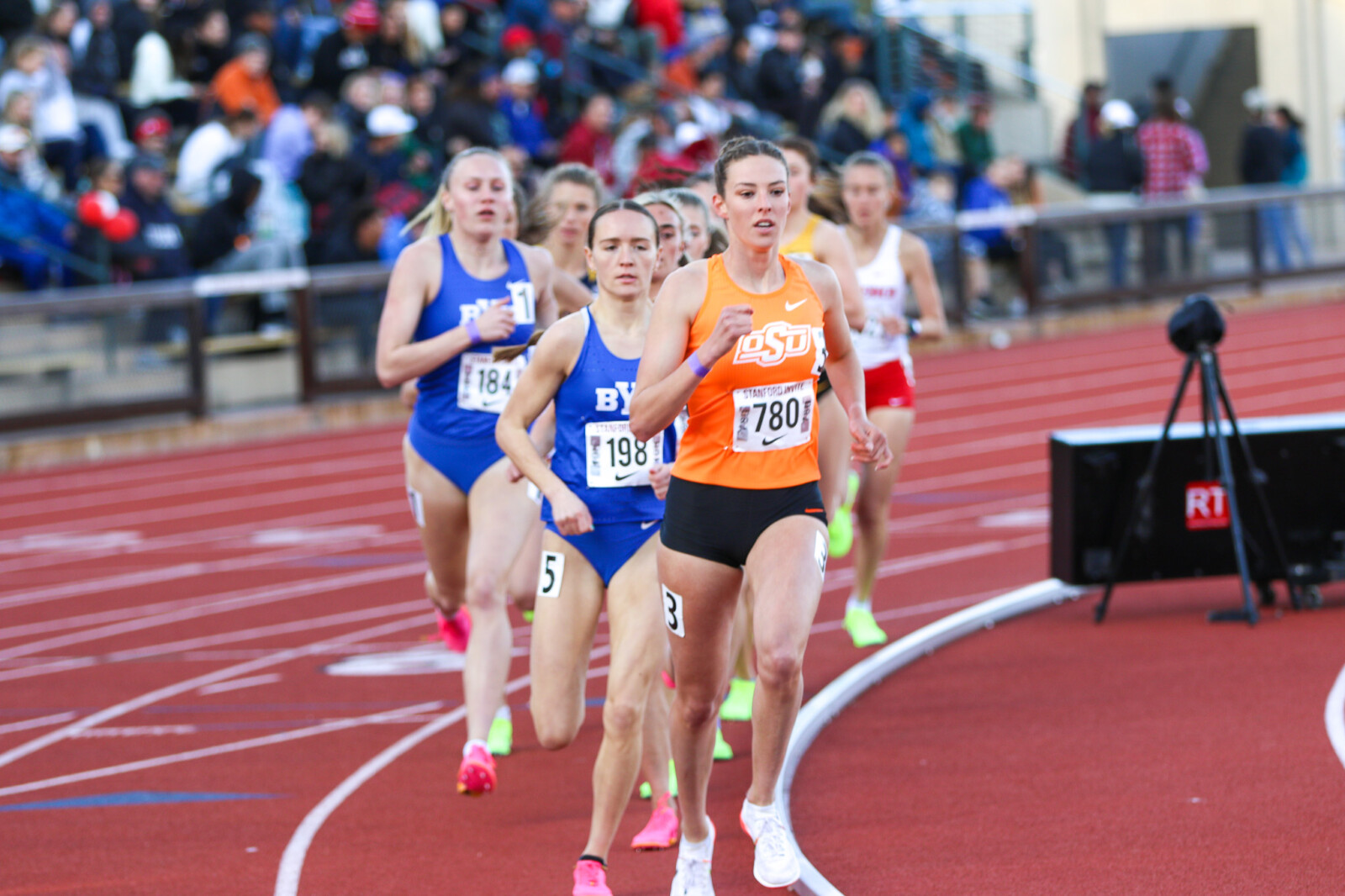
Sivan Auerbach ran in an athletics competition in an Oklahoma State uniform (Photo: Oklahoma State XC/TF)
Following this, they turned to the president of the university and convinced her to take a stand against the terrorism of Hamas. “We tried to make it clear that condemning an event of this type is not a political statement, it’s a human statement. There is an interest among Americans that they are afraid to express an opinion, so as not to anger anyone on a subject they feel they are not 100% experts on,” says Auerbach. “You don’t need to be an expert to condemn terrorism, blind hatred and anti-Semitism.”
The efforts bore fruit with a clear statement against terrorism and in favor of Israel in the main game of the university’s football team in front of an audience of 80 thousand people. “Before the start of the game, there was a moment of silence in memory of the murdered and kidnapped, the Israeli flag was shown on the big screen. Did we change worlds? I don’t think so, but it was important that we make our voices heard and that there are things that don’t go over in silence.”
Auerbach sets a goal for herself later this year to reach the European Championships in June in Rome and the Olympics to be held in Paris this summer through the world rankings. To get there, she must achieve a critical score in the world rankings. An almost impossible task in colleges. That’s why she decided that in the summer season she will not compete in the USA, but will go to Europe.
“Starting in May, I plan to focus on going to as many competitions in Europe as possible, in order to get a world ranking score there. In any case, every competition you do is valid for a year, so even if it doesn’t help me for the Olympics, it will help me for the European Indoor Championships next winter. And if This year I won’t make it to the Olympics, so in 2028.”
#Sion #Auerbach #breaks #records #athletics #track #shares #injured #didnt #puberty
2024-03-28 23:17:37




:strip_icc()/i.s3.glbimg.com/v1/AUTH_59edd422c0c84a879bd37670ae4f538a/internal_photos/bs/2023/l/E/HqZei9QOAb9MBIFxnlag/dsc-1634.jpg?w=150&resize=150,150&ssl=1)


